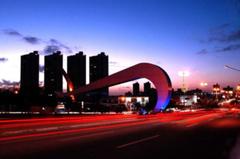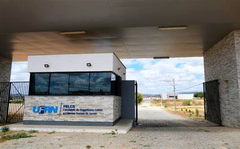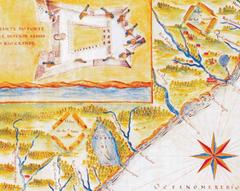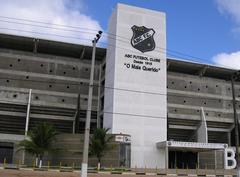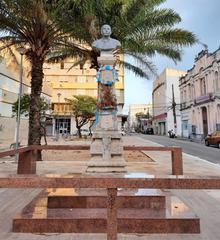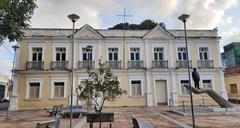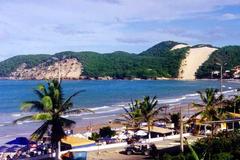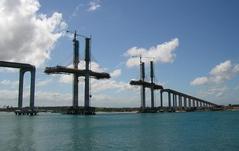
Alberto Maranhão Theatre, Natal, Brazil: Visiting Hours, Tickets, and Travel Guide
Date: 04/07/2025
Introduction: The Heart of Natal’s Cultural Heritage
The Alberto Maranhão Theatre is a crown jewel of Natal, Brazil—a living monument to the city’s artistic evolution and architectural grandeur. Since its inauguration in 1904, this landmark has mirrored Natal’s growth, blending neoclassical elegance with European influences and serving as a vibrant hub for the performing arts. Whether you’re a culture enthusiast, architecture lover, or simply exploring Natal’s historic center, the theatre promises a rich, immersive experience (Julia Chaves Arquitetura).
Table of Contents
- Origins and Construction
- Architectural Highlights
- Renaming and Historical Evolution
- Roles and Community Impact
- Preservation and Restoration
- Visiting Information: Hours, Tickets, and Tours
- Accessibility and Amenities
- Events and Festivals
- Nearby Attractions
- Visitor FAQs
- Travel Tips and Recommendations
- Sources
Origins and Early Construction
The theatre’s story began in 1898, spearheaded by Governor Ferreira Chaves and architect José de Berredo. Conceived as Teatro Carlos Gomes, it reflected Natal’s modernization drive post-Brazilian Republic and aimed to offer a sophisticated space for cultural engagement and leisure (Julia Chaves Arquitetura). Its inauguration on March 24, 1904, was a milestone in Natal’s cultural history, introducing an eclectic blend of neoclassical and European chalet styles.
Architectural Highlights
Exterior Features
The façade exemplifies neoclassical symmetry, ornate columns, and elaborate molding, enhanced by Belgian and French influences. Notable are the imported French iron railings and the “Art” statue by Mathurin Moreau, which welcomes visitors at the entrance (Natal Rio Grande do Norte). The building’s dimensions—78.60 meters long and 18.30 meters wide—create a commanding presence in Praça Augusto Severo.
Interior Design
Inside, the grand auditorium features period furnishings, gilded balconies, and a proscenium stage. The design prioritizes acoustics and sightlines, making it ideal for classical concerts and theatrical performances. Ornate plasterwork, imported finishes, and elegant lighting contribute to an atmosphere of timeless sophistication (Inner Brazil).
Renaming and Historical Evolution
In 1957, the venue was renamed Teatro Alberto Maranhão to honor the governor instrumental in its construction and early reforms. Successive renovations—especially in 1960, 1988, and for the 2004 centenary—have preserved its architectural integrity while incorporating modern amenities like air conditioning and accessibility upgrades (Agora RN; Wikipedia).
Multifunctional Role and Community Impact
Beyond its artistic legacy, the theatre has adapted to Natal’s evolving needs. It has served as a cinema (1928–1930), city council chamber (1952–1954), and currently as a stage for diverse cultural expressions—including music, dance, drama, and festivals. Its programming democratizes access to the arts and strengthens Natal’s civic identity (Julia Chaves Arquitetura).
Preservation and Restoration
Designated a protected heritage site by IPHAN in 1985, the theatre has undergone extensive restoration, especially since 2015, to address structural issues and modernize its facilities. These efforts ensure continued preservation of its historical elements and adaptation to contemporary standards (Agora RN).
Visiting Information: Hours, Tickets, and Tours
- Visiting Hours: Generally open Tuesday–Sunday, 8:00 AM–6:00 PM (Frommer’s). Event days may have extended hours.
- Tickets: Prices are affordable, varying by event. Discounts are often available for students, seniors, and groups. Purchase at the box office or online through official platforms.
- Location: Praça Augusto Severo, Cidade Alta, Natal, RN, Brazil. Easily accessible via public transport, taxi, or on foot from major city attractions.
- Guided Tours: Offered regularly and recommended for deeper insight into the theatre’s history, architecture, and role in Natal’s culture.
Accessibility and Visitor Amenities
Recent renovations prioritize accessibility, with ramps, elevators, and designated seating for visitors with disabilities. Modern amenities such as air conditioning and clean restrooms enhance comfort. Knowledgeable staff ensure a welcoming atmosphere (Wikipedia).
Events and Festivals
The theatre is a key venue for the Festival Internacional de Corais de Natal (FIC Natal), classical concerts, ballets, and drama, attracting local and international talent (Maestria Produção Cultural). Its calendar includes both traditional and contemporary works, fostering cultural exchange and community engagement.
Nearby Attractions
- Forte dos Reis Magos: A historic fortress with panoramic views (Kayak Guide, The Tourist Checklist).
- Museu Câmara Cascudo: Highlighting regional anthropology and folklore.
- Parque das Dunas: Urban park ideal for nature lovers.
- Ponta Negra Beach: Famous for its lively nightlife and golden sands.
- Local Markets: Handicrafts and souvenirs at the Centre of Tourism in Petrópolis.
Combine your theatre visit with these sites for a full immersion in Natal’s culture.
Visitor FAQs
What are the theatre’s opening hours?
- Usually Tuesday–Sunday, 8:00 AM–6:00 PM. Check the official schedule for variations during events.
How can I buy tickets?
- Purchase at the box office or online via the official website.
Are guided tours available?
- Yes, often during visiting hours. Inquire in advance for availability.
Is the theatre accessible?
- Yes, with ramps, elevators, and accessible seating.
What’s the dress code for performances?
- Smart casual attire is recommended, especially for evening events.
Can I take photos inside?
- Photography is permitted in the lobby and exterior, but not during performances.
Travel Tips and Recommendations
- Arrive Early: Allow at least 30 minutes before performances for ticket collection and seating.
- Language: While most shows are in Portuguese, music and dance are universally accessible.
- Stay Informed: Follow the theatre’s social media channels for schedule updates and event news.
- Plan Ahead: Major festivals like FIC Natal may require advance booking for both tickets and accommodation (Maestria Produção Cultural).
- Combine Experiences: Visit nearby attractions, enjoy local cuisine, and explore Natal’s historic center for a complete cultural journey.
Sources
- Julia Chaves Arquitetura
- Natal Rio Grande do Norte
- Agora RN
- NatalRN
- Frommer’s
- Maestria Produção Cultural
- Kayak Guide
- The Tourist Checklist
- Inner Brazil
- Wikipedia
- Elias Jornalista

